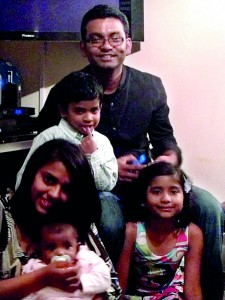In my own words and searching
View(s):Adopted as a baby, Rebecca N. Pararajasingam is looking for her biological mother
Welcoming an adopted infant or child into your life can bring tremendous joy and Sri Lanka has seen over 34,000 children adopted internationally. However, with that comes also pain and tears, as a number of adoptees return to seek out their origins; heritage; their roots and in essence their story.

Rebecca with her husband and 3 children
I was a three-month-old baby when I was adopted by a Sri Lankan Tamil couple living in England. They chose me from Lady Ridgeway Hospital one day in July 1979 and on the 25th of July 1979, I left the Colombo courts, out of the land that bore me to live with strangers in a strange land.
As a Sri Lankan-British adoptee, I spent many years as a child, even though I was in the UK educated in the best of schools and universities, somewhat unconnected to the world and those around me. I knew deep down there was no true connection between those raising me and myself. There was no bond whatsoever. Even being brought up by Sri Lankan Tamil parents, I still knew that I was somewhat not in the right culture; there was a missing jigsaw puzzle at every turn.
If I were to describe it, it was an excruciating internal pain of not knowing, not belonging and in many ways being at a total loss.
As I entered adulthood, I decided to try and understand the root cause of this pain, the pain adopted children feel and found that this had been studied by a number of key psychologists in the field globally. I came across the concept of the ‘Primal Wound”, described by Nancy Verrier, a psychotherapist and adoptive mother whose work is now widely recognized by professionals.
This ‘Primal Wound’ described every feeling and emotion I spent years unable to verbally describe to anyone.
“Many doctors and psychologists now understand that bonding doesn’t begin at birth, but is a continuum of physiological, psychological, and spiritual events which begin in utero and continue throughout the postnatal bonding period. When this natural evolution is interrupted by a postnatal separation from the biological mother, the resultant experience of abandonment and loss is indelibly imprinted upon the unconscious minds of these children, causing that which I call the ‘primal wound’.” – Nancy Verrier wrote in her landmark 1993 book, The Primal Wound – Understanding the Adopted Child.
Marcy Axness, Ph.D., a leading authority in the fields of early human development, adoption, prenatal psychology, and interpersonal neurobiology, writes of the astounding findings about what a foetus experiences in the womb, what a strong connection it has with the mother long before birth, and how intelligent, aware and remembering a newborn is.
Marcy Axness goes on to say that rather than deeply question whether the experience of separation in adoption is traumatic, we as a society tend to believe that enough love and care can make everything right. But psychologists have taught us that the first stage of psychological growth includes the development of trust, as a foundation for secure relationships with others, and ourselves. Babies who are separated from the only connection they’ve ever known—their primordial biological and psychological matrix—have had their nascent sense of trust deeply violated.
You may think that I should be grateful that I have been blessed to have been given, a life that many Sri Lankan children would only dream to have, and yes, that is true in so many ways, but I hope to explain to society that amongst the material wealth, there is a deep pain that never leaves an adopted child. If I were to be true to my feelings, I would much rather have remained with my mother, even through poverty, than experience the pain of not even knowing the name given to me, but only knowing sparse information of my possible DOB 18.04.1979 and place of birth being De Soysa Maternity Home.
It is very lonely and isolating to feel different from those you should feel the closest to, your family. The past is as important to adopted people as their future; wanting to know where we come from, our heritage, our culture. It is the present that is most troublesome. Not knowing where we fit into the spectrum of happenings is a great issue for us.
Now as a mother of three children myself, the time has arrived for me to make this journey to find my roots; to find my mother and in doing so to heal both mine and her wounds. Her three grandchildren are also anxiously hoping they will meet ‘mummy’s first mummy’ as they call her. In an island of around 21 million people, I wish just one of you out there can give me the answers. (rebecca.para@gmail.com)
Follow @timesonlinelk
comments powered by Disqus



















